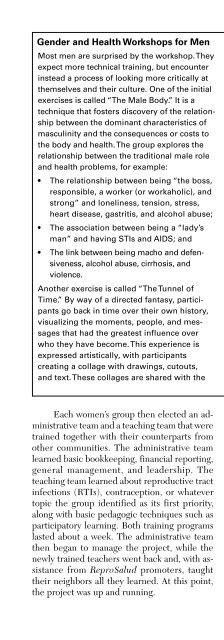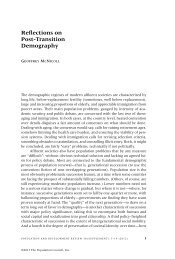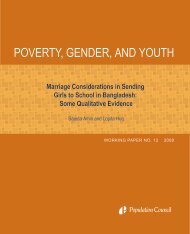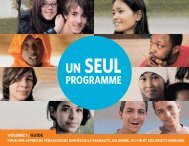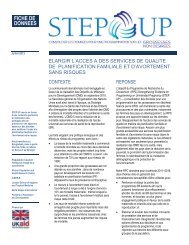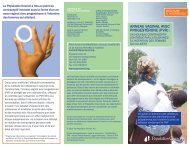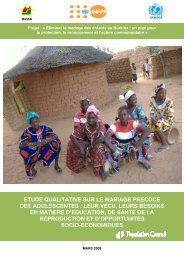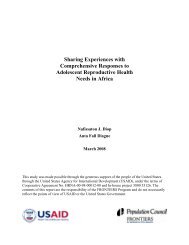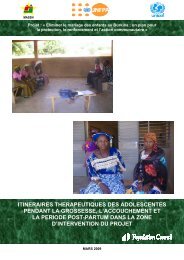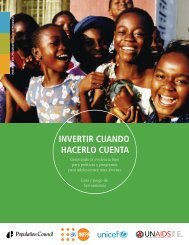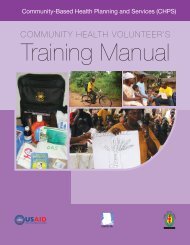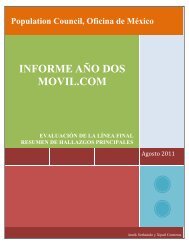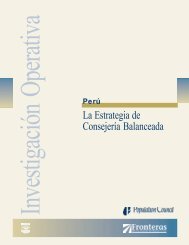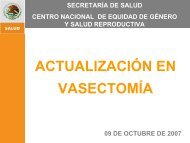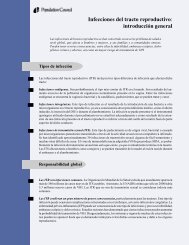QCQ# 10 Alone You are Nobody, Together We Float: The Manuela ...
QCQ# 10 Alone You are Nobody, Together We Float: The Manuela ...
QCQ# 10 Alone You are Nobody, Together We Float: The Manuela ...
Create successful ePaper yourself
Turn your PDF publications into a flip-book with our unique Google optimized e-Paper software.
Gender and Health Workshops for Men<br />
Most men <strong>are</strong> surprised by the workshop. <strong>The</strong>y<br />
expect more technical training, but encounter<br />
instead a process of looking more critically at<br />
themselves and their culture. One of the initial<br />
exercises is called “<strong>The</strong> Male Body.” It is a<br />
technique that fosters discovery of the relationship<br />
between the dominant characteristics of<br />
masculinity and the consequences or costs to<br />
the body and health. <strong>The</strong> group explores the<br />
relationship between the traditional male role<br />
and health problems, for example:<br />
• <strong>The</strong> relationship between being “the boss,<br />
responsible, a worker (or workaholic), and<br />
strong” and loneliness, tension, stress,<br />
heart disease, gastritis, and alcohol abuse;<br />
• <strong>The</strong> association between being a “lady’s<br />
man” and having STIs and AIDS; and<br />
• <strong>The</strong> link between being macho and defensiveness,<br />
alcohol abuse, cirrhosis, and<br />
violence.<br />
Another exercise is called “<strong>The</strong> Tunnel of<br />
Time.” By way of a directed fantasy, participants<br />
go back in time over their own history,<br />
visualizing the moments, people, and messages<br />
that had the greatest influence over<br />
who they have become. This experience is<br />
expressed artistically, with participants<br />
creating a collage with drawings, cutouts,<br />
and text. <strong>The</strong>se collages <strong>are</strong> sh<strong>are</strong>d with the<br />
Each women’s group then elected an administrative<br />
team and a teaching team that were<br />
trained together with their counterparts from<br />
other communities. <strong>The</strong> administrative team<br />
learned basic bookkeeping, financial reporting,<br />
general management, and leadership. <strong>The</strong><br />
teaching team learned about reproductive tract<br />
infections (RTIs), contraception, or whatever<br />
topic the group identified as its first priority,<br />
along with basic pedagogic techniques such as<br />
participatory learning. Both training programs<br />
lasted about a week. <strong>The</strong> administrative team<br />
then began to manage the project, while the<br />
newly trained teachers went back and, with assistance<br />
from ReproSalud promoters, taught<br />
their neighbors all they learned. At this point,<br />
the project was up and running.<br />
group. For most of the men, this is the first<br />
time they have systematically thought about<br />
gender dynamics in their own lives and<br />
sh<strong>are</strong>d experiences with other men in a<br />
noncompetitive, alcohol-free environment.<br />
From this point of departure, the group is<br />
ready to delve more deeply into the involvement<br />
of men in violence, alcoholism, sexuality,<br />
and fatherhood. Subsequent units focus on<br />
reproductive and sexual anatomy and physiology,<br />
women’s rights, gender roles, contraception,<br />
the particular reproductive health issues<br />
that the women in their community identified<br />
as their priorities in the self-diagnostic workshops<br />
(e.g., RTIs), and the role of men in<br />
familial abuse. In this last topic, which is<br />
difficult for men to contend with, the goal is to<br />
sensitize them in terms of the experiences of<br />
mistreatment or abuse that they themselves<br />
may have suffered or witnessed, and from<br />
there touch on the violence that they inflict on<br />
others. According to Benno de Keijzer:<br />
It is key to touch their own emotionality and<br />
the cultural ideas that serve as a base for<br />
violence toward the family. In the experience<br />
of ReproSalud, we have seen the same thing<br />
that has emerged in other countries: <strong>The</strong>re <strong>are</strong><br />
growing contingents of men willing to reflect<br />
and to live in a different way.<br />
During the first two years in the field,<br />
ReproSalud identified 79 mothers’ clubs as partners<br />
and began the subgrantee process. Several<br />
clubs have now completed their first project and<br />
begun a second cycle of activities.<br />
ReproSalud’s plan was based entirely on<br />
working with women. However, early on, the<br />
women questioned this plan, because they wanted<br />
to involve their husbands in the educational workshops.<br />
In some cases, women were attempting to<br />
erode male opposition. But more often, women<br />
were going home excited about what they were<br />
learning and experiencing, and their husbands<br />
wanted to know more about the workshops.<br />
Initially there was concern about shifting<br />
resources away from women’s activities, but<br />
ReproSalud soon modified the project’s design<br />
15


